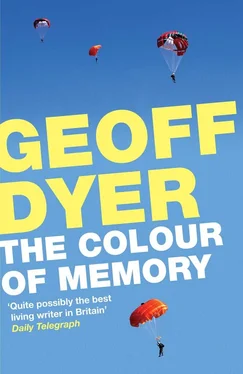‘Five. .’ she continued. ‘Five. .’
‘That’s it,’ she said.
‘Hey, listen I know that’s not a real number,’ I said.
‘Why?’
‘It’s only got six digits. London numbers have seven.’
‘I’ll see you around,’ she said, smiling and leaving.
I looked out of the kitchen and into the living-room which had thinned out now. There were more empty bottles than people. Foomie was sitting on the arm of the sofa, talking to Steranko who had taken off his jacket and was propped up against a wall and drinking from a can like some swilled-out Valentino. She was laughing. Her hand rested on his for a moment as she said something I couldn’t hear.
Something was happening. You could tell something was happening by the way everybody was asking everybody else what was happening. Railton Road was cordoned off. Police were everywhere. I was back in the DIY shop, wishing I measured things more accurately. Unable to find a tape measure I’d spent the morning calculating distances in terms of LP covers and Penguin books — quite a satisfying activity in an imprecise sort of way — and now, with the help of one of the assistants, I was busily converting everything back into feet and inches.
Ten minutes later all the stock from outside was bundled in and the shutters were yanked down.
‘There’s going to be a riot,’ claimed the manager with conviction, ushering customers out of the shop. Hardly a day goes by in the summer without a riot being predicted: it’s done like farmers forecasting the weather (‘red sky in the evening, the ghetto is burning’) but with less accuracy. Outside everyone just milled around while the diverted traffic congealed around them. I trudged back to my cave, eighteen foot (approximately) of shelving digging into my collar-bone.
From the roof of my block I looked out over the streets but everything was quiet, except for Concorde booming modernly overhead.
People were still talking about what had happened late that afternoon when I went over to Terry’s, the greengrocer on Tulse Hill.
‘The police raided a couple of houses on Railton Road,’ Terry explained to a shopful of customers.
‘They came down on the train,’ said a woman with pink streaks in her hair. ‘Like football hooligans.’
Terry was a big white guy whose thinning blond hair made him look older than he was. The shop was open till seven six days a week and until lunchtime on a Sunday. Terry was always there; even when he was out at the market picking up new produce in his van he was somehow still in the shop. Not only was he always there, he was always in a good mood. Whatever time of the day you went in he was joking or shouting hello to somebody. Such was the value everyone placed on Terry’s high opinion of them that no one even dreamed of ripping stuff off or getting impatient or swearing because of the queue.
As well as all the usual fruit and veg he stocked a full range of West Indian vegetables and an array of wholewheat bread, natural yoghurt, free range eggs, tofu and vegan cheese. At the same time he kept an eye on tradition with a few packs of bacon and pork sausages stashed away in the fridge. Although it wasn’t actually on a corner, Terry’s was the heir to the idea of the corner shop but it also represented an unusual alliance of hard-working grocer shop economics with the anarcho-vegetarian culture of the inner city. One way and another he kept everyone happy.
I was just coming out of the shop when I bumped into Steranko and Carlton, both stoned and wanting something to eat. I offered to cook them an omelette and the three of us walked back to my flat. It was the first time they’d been there since I moved in.
‘Shit, it smells like a skunk’s toilet,’ Carlton said as we made our way up the stairs, past marker-pen signatures and purple band-names in fluorescent Bronx script.
‘What d’you call that?’ said Steranko a few minutes later as the reinforced door clanged shut behind us. ‘Lubyanka chic?’
Carlton laughed: ‘Man, you might as well go the whole way — get yourself a drawbridge and portcullis while you’re at it. Look at this,’ he said, picking up the entry-phone by the door. ‘When you get really paranoid you can just pick this up and listen to the outside world. . Is there anybody there? Is there anybody there?’
With that they went through to the main room and lurched around there for a while. The day before I’d bought some flowers and put them in a jug on the window-sill: they had elegant green stems and purple petals with yellow dots. Carlton looked at the jug of flowers and said, ‘Even here there is life.’
‘Nice isn’t it?’ I prompted.
‘Not exactly cosy is it?’
‘Course it isn’t cosy. It’s cosier than that place you live in. All you’ve got in that room is bare boards. Besides, comfort can never do as verb what it boasts as noun.’
‘Who said that?’
‘Guess.’
‘Freddie?’
I nodded.
‘You know what sort of block this is?’ said Carlton, gazing out of the window.
‘Not really.’
‘It’s the kind of block where people draw their curtains early.’
‘Look at this,’ I said when we were back in the kitchen, turning on the hot-water tap and letting it run.
‘So? You’ve got hot water,’ said Steranko. ‘Very twentieth century.’
‘It’s free. You can waste as much as you want. You can leave it running all night if you want. .’
Later that evening, weighed down by large slices of an unappetising Spanish omelette, we walked down to the Atlantic. A lot of police were still around, walking the streets in twos and threes or waiting in buses parked some distance off in case anything happened. Groups of black and white youths were walking round too, falling silent as they passed the grim-faced police. The Atlantic was right at the focus of all this activity. It used to be a dingy boozer; then it got to be very popular as people were drawn there by the slight uneasiness as well as the fact that there was live jazz and the bar stayed open until midnight. After eleven it tended to fill up with people from the Albert, the pub across the road that was always packed with trendies complaining about how trendy and packed it was. The Atlantic was also well known as the place you could buy grass — an arrangement that suited everyone, dealers and punters alike, since the beer was awful. A lot of good musicians played there and even if they weren’t so hot the place always gave an edgy intensity to their playing.
It was a warm evening and people had spilled out on to the pavement, the sheer sound of trumpet and saxophone slashing brightly into the dark street. The trumpet held notes that were long and high as a tightrope stretched out across the night.
When the band had played a quick encore more people came outside and stood around talking and drinking. Police vans cruised slowly past. No bottles smashed against their windscreens.
People began leaving the pub and we started walking home. Steranko turned right at the top of Cold Harbour Lane and Carlton dashed for a bus, waving to me as it pulled away. There was hardly anyone around. A few cars went past. It occurred to me that the whole idea of street life in this country came into existence at exactly the moment when, it was claimed, the streets became unsafe to walk in, when crime began destroying a way of life that had never actually existed.
A couple of young guys, one of whom I vaguely recognised, walked towards me. He nodded, ‘Ah right.’
‘OK.’
I walked slowly, enjoying the feel of the warm night and the clouds drifting like whales across the sky.
For the rest of that week I had some work with a market research company. On the way home one evening I dropped in at the Effra. Freddie was there, pissed off and standing by the bar on his own. That morning he’d been burgled.
Читать дальше












